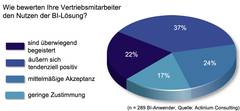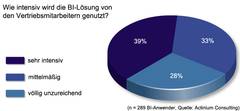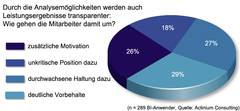10.07.2010
Business Intelligence in Sales with Light and Shadow
While the topic of business intelligence (BI) is becoming more and more established in the strategies of corporate management, sales employees still have an ambivalent relationship to it. On the one hand, they consider these solutions to be beneficial for their work, but on the other hand, they are not yet comfortable with the fact that their work results are becoming more transparent as a result of the analyses. This is the conclusion of a survey conducted by Actinium Consulting among nearly 300 BI users selected across all industries.
According to the survey, users of business intelligence solutions in three out of five companies are convinced of the benefits of this technology for their sales activities. In one in five, it is predominantly rated as very helpful, and in another 37 percent of companies, there is a tendency for these employees to rate it positively. All other sales managers surveyed spoke of moderate acceptance (24 percent) or even low approval (17 percent). However, the majority’s positive assessment is contradicted by the actual degree of use. According to the Actinium survey, sales staff access their BI solutions intensively in only two out of five companies, while another third use them at least moderately often. However, 28 percent of respondents rate the interest in the sales team as “completely inadequate” in terms of how information is handled.
A similarly critical picture emerged from the question of how acquisition staff rate the fact that their work results are becoming more evident due to BI analyses: In 29 percent of the companies, they show clear reservations about the possibilities of stronger performance control; in a similarly large proportion of companies, the increased transparency is eyed skeptically. Only in one in four cases does the use of BI trigger additional motivational impulses among sales personnel. “Actually, positive effects should be the normal case, since continuously updated evaluations, for example, on the sales development of products represent a high value for the sales staff, because they can derive important indications for their own sales activities from the analyses,” judges Actinium managing director Klaus Hüttl.
For him, the results of the survey are then also an expression of the fact that in many cases a sufficient BI culture has not yet been developed in the companies. “Business Intelligence must not be reduced to a mere technical instrument, but rather BI must be actively lived so that the potential benefits can actually be activated,” Hüttl demands. This also means that users of BI solutions must learn to overcome their fear of greater transparency. “After all, it is precisely the core objective of business intelligence to disclose the conditions in the company that are critical to success in order to gain better control options. However, this requires a pronounced acceptance on the part of the employees.” The Actinium managing director therefore recommends that companies give this aspect a higher priority and anchor it conceptually more firmly in the BI strategies. “The aim must be to win over employees as active co-creators of business intelligence.”



